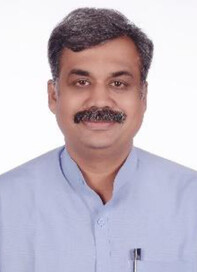In conversation with Mr. Avinash Karmarkar, Vice President of Vasudha Farm Projects
Mr. Avinash Karmarkar, Vice President of Vasudha Farm Projects since 2014, takes us to the journey behind what makes the Organization truly unique and sustainable, successfully catering to the needs of end to end cotton value chain in the Fairtrade System.

Q.Can you brief us about the background of the Organization
A. All these 20 years working with farmers we have learnt a great deal. Initially we were all cotton centric. Market provided good premium for organic cotton thus all seed and organic inputs were distributed upfront to farmers and the cost was recovered at the time of cotton procurement. Gradually market became competitive and premium got reduced. Business could not afford to invest upfront in seed and inputs. Besides, farmers too saw little commercial benefit in growing only organic cotton. This time we realized that we need to be farm centric rather only cotton crop centric.
We started working on finding farm solutions which can reduce cost of inputs for farmers & extended our training support for all crops. This too was not enough as farmers face a lot of problems as community. This was the time when we shifted our focus from being farm centric to community centric. Fairtrade aligned with this approach and the result was Vasudha organic Farmers’ Welfare Society was established in 2006 under Fairtrade certification and is today one of India’s largest Fairtrade organic cotton farmers’ networks.
Q.What are the different cotton products that you supply? How much of the products are sold on FT terms? Do you have a market for volume unsold on Fairtrade terms?
A. We are a vertically integrated manufacturing facility. We manufacture cotton yarns (Greige & Mélange), cotton fabrics and cotton garments besides manufacturing blends at all the three stages. We are able to supply Cotton FT Yarns and Garments to interested customers. We are working on increasing our FT sales. In recent past we have seen a decline in FT sales. We produce around 800 MT FT lint and are able to sell 40% of it as FT. Rest of the cotton gets premium for farmers for being organic. Unsold cotton thus is sold as organic.
Q.Where are the various sales channel implemented by the organization to penetrate the global Fairtrade market? How can you scale up for this type of distribution?
A. Our products are currently sold in USA, Canada, Germany, Spain, Sweden, South Africa, Australia, New Zealand and India. All these sales are directly with brands. We have been proposing FT garment production to our customers and will start by next year.
Q.Can you name major retails brands that you are currently supplying Fairtrade cotton to? Is there a growth in demand?
A. Kathmandu, Coop Italia, Rajlakashmi Mills, DKS Textile.
Q.Can you brief us on the progress towards conversion into SPO?
A. We have already formed a Farmer Producer Company in the name of Vasudha Farmer Prouder Company. Existing PEB members have given training to undertake the process of transformation forward. With the support of NAAP Program Officer this process will completed in another one year.
Q.So, how do you foresee global market of Fairtrade cotton to other sustainable cotton and responsible fibres in years to come? How can producers prepare themselves to align better with the competition?
A. Given the process control and practices, Fair Trade has a good potential in cotton. But we need to look at the costs to ensure the competitiveness too.
Q.What is your take on the effects of climate change on cotton production and how can producers adapt and develop remedial measures to manage their crop in variable climates.
A. Climate is biggest challenge for the cotton farmers. Organic farming is the answer to tackle most of the climatic changes. A holistic approach needs to be taken in this regard. At macro level, changes will take time but farmers need to work on improving micro climate of farm by inculcating intense muti-cropping with cotton, plants on bunds/periphery of farms, use of bio mass in farming, pest and drought resistant indigenous seed varieties, judicious use of irrigation water, agro forestry at community level are some measure which needs to be taken on war foot basis.
Q.What advice would you give to other cotton producers who wants to follow the model of end to end supply chain?
A. End to End supply chain would mean setting up manufacturing facilities with considerable investments and working capital requirements. The end-to-end supply chain for cotton would mean ginning, spinning, fabric, apparel (or any other cotton product) manufacturing which is a huge investment. If a cotton producer has this kind of support, end-to-end supply chain can be set. Alternatively, this can also be developed on an outsourcing model wherein other manufacturing facilities can be contracted.



